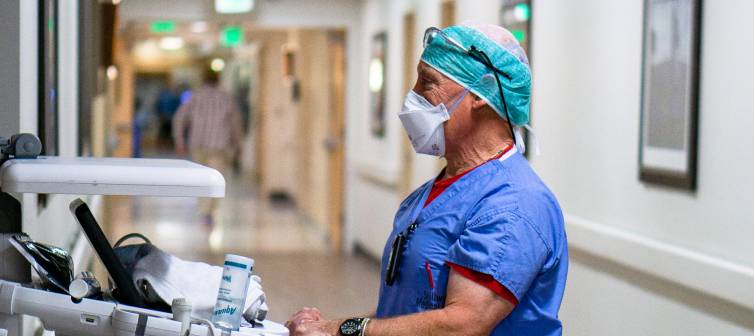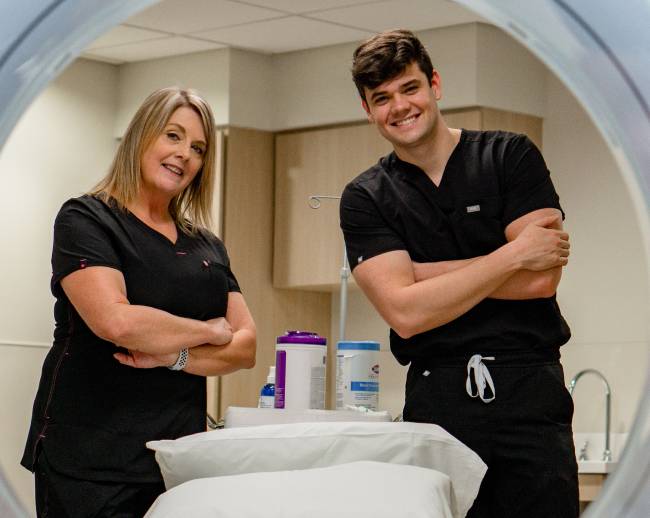
As November begins, so does Movember, the annual movement encouraging men to grow mustaches to spark conversations and raise awareness around critical issues in men’s health. This initiative shines a spotlight on often-overlooked areas such as mental health, prostate cancer and testicular cancer, aiming to reduce stigma and encourage men to seek preventive care.
Dr. Dylon Howard, a family physician at Stillwater Medical Physician’s Clinic, addressed some common questions related to men’s health and says true health goes beyond an annual physical.
Q: What’s important for men to know about their health?
A: Health is not just the physical. It’s not just checking your lab work or getting a screening. Health is something people should be thinking about every day in everything they do. Whether it be managing your stress, getting adequate sleep, keeping a healthy diet, keeping a good social structure, keeping good sexual health – all of those are fundamental and really need to be in balance for longevity and a healthy life.
Q: What health issues men should be aware of?
A: Cardiovascular diseases and diabetes are extremely prevalent in men, as well as women, for that matter. For men, we’re seeing more and more metabolic syndrome, liver disease and obstructive sleep apnea. A lot of them will also come in worried about testosterone and hormone levels, which are extremely important. All of those conditions really do interact with one other, so you have to be mindful of each one as you address their specific health needs.
Q: What preventative steps and screenings would you recommend for men?
A: As a family physician, I really enjoy helping my patients navigate their health and develop a plan. That could be a plan for their current health and also their future health. By seeing a primary care physician on an annual basis, we’re able to have those interactions.
Blood pressure is an important indicator in preventative exams. Depending on the patient’s history, blood pressure is rarely an isolated condition. Our typical American diet, our more sedentary nature and other factors can certainly contribute to blood pressure issues. This indicator can also run with other conditions like obstructive sleep apnea, obesity, elevations in cholesterol and triglycerides.
Cancer screenings are also important for men. The recommended age for colon cancer screenings was recently decreased from age 50 to age 45. There are different screening methods. A colonoscopy is still the test of choice but there are alternatives like a Cologuard test, yearly stool tests and others depending on patient preference and family history. Men may also talk to their physician about a prostate cancer screening to determine if it’s right for them. It’s a commonly performed blood test that measures prostate-specific antigen (PSA) to help diagnose prostate cancer.
Having a conversation with your doctor about smoking and tobacco use is also recommended. We can help with smoking cessation and there are other screening tests that can be done on smokers. These help with early detection of cardiovascular disease, peripheral vascular disease and lung cancer screenings for patients who qualify.
Many of the screenings I mentioned are covered by insurance or offered at an affordable cost to help identify health issues early.
Q: What common hesitations do you observe in men when it comes to their health?
A: A lot of men may not be comfortable talking about the topic of mental health when it comes to anxiety and depression. With all the changes we’ve seen in society, we’ve added another important screening for this because it’s more prevalent today. Asking some of these screening questions helps us identify mental health factors at play and allows us to approach it in a caring way.
Q: How can those who are concerned for a loved one’s health best approach the topic with them?
A: I would recommend the best way to approach someone is to do it in a loving and caring way. Bring up your concerns by framing it in a way that the other person knows they’re really cared for and your intentions are in the right place. It may not be something immediate. It may require continued discussions and attempts, but sharing your compassion and love for another person will go a long way.
For more information about men’s health, Dr. Howard recommends the American Academy of Family Physicians. If you have a specific health concern and want to schedule an appointment, Dr. Howard is accepting new patients and appointments can be scheduled at (405) 743-7300.







